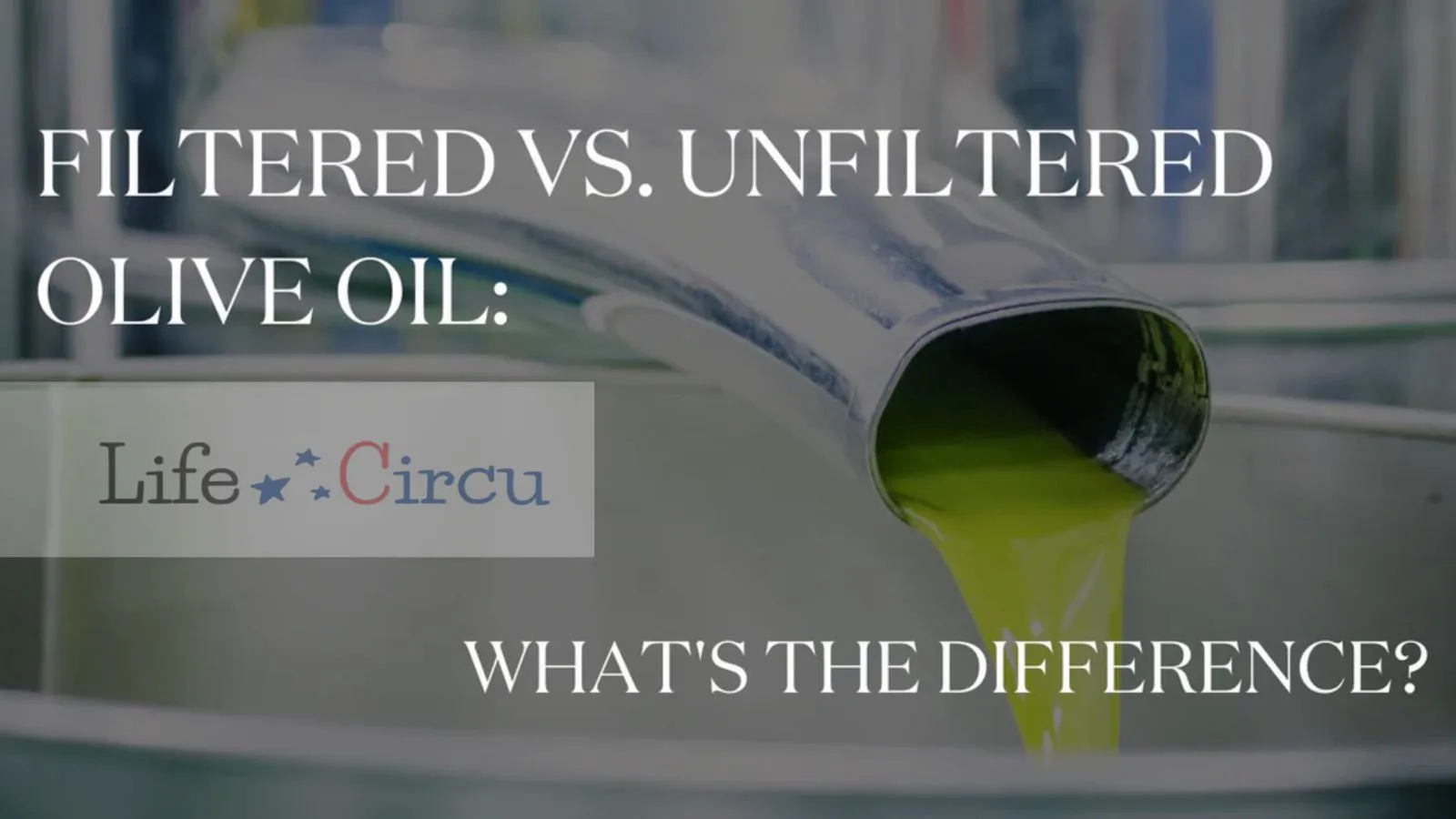Unfiltered vs. Filtered Olive Oil: Understanding the Key Differences and Benefits
Olive oil, a cornerstone of Mediterranean cuisine, has a rich history and diverse uses. Among its varieties, unfiltered olive oil and filtered olive oil often spark curiosity. What sets them apart, and which is the better choice for your kitchen? In this article, we’ll uncover the Unfiltered vs. Filtered Olive Oil, delve into the nutritional differences in olive oil, and highlight the health benefits of filtered olive oil. Let’s explore the world of olive oil clarity and flavors to discover what makes each unique.
What is Unfiltered Olive Oil?
Unfiltered olive oil is raw, minimally processed, and retains a natural, cloudy appearance due to olive particles. This variety of oil showcases sediment in olive oil, giving it a rustic and authentic character. Extra virgin unfiltered olive oil is particularly popular among those seeking robust flavors and maximum nutrients.
Characteristics of Unfiltered Olive Oil
- Cloudy olive oil vs clear olive oil: Unfiltered olive oil is cloudy due to tiny fragments of olive skin and pulp.
- Raw olive oil characteristics: Maintains more natural enzymes, antioxidants, and polyphenols.
- Retains sediment that settles at the bottom over time, adding visual and textural uniqueness.
- Has a shorter shelf life compared to its filtered counterpart.
Unfiltered Olive Oil Benefits
- Higher antioxidant levels provide superior protection against free radicals.
- Richer, bolder flavor enhances dishes with its natural, fruity taste.
- Minimal processing ensures nutrient preservation and retains authenticity.
What is Filtered Olive Oil?
Filtered olive oil undergoes an additional olive oil filtration process to remove any sediments or water content, resulting in clear, polished oil. The process enhances filtered olive oil stability, making it a preferred choice for many consumers.
Characteristics of Filtered Olive Oil
- Clarity in olive oil production: Achieved by filtering out impurities to ensure consistency in appearance and texture.
- Ideal for long-term storage due to enhanced stability and reduced chances of spoilage.
- Lighter in flavor, making it suitable for delicate recipes.
Filtered Olive Oil Advantages
- Filtered olive oil storage tips: Extended shelf life makes it a reliable pantry staple.
- Removes impurities, reducing the risk of rancidity or fermentation.
- A smoother and more refined taste complements mild dishes effortlessly.
Traditional vs. Modern Olive Oil Processing
The production methods of olive oil have evolved, impacting its quality and characteristics. Comparing traditional vs modern olive oil processing reveals insights into how unfiltered and filtered varieties are made.
Traditional Processing
- Focuses on minimal intervention, preserving natural sediment and enzymes.
- Relies on pressing techniques that retain the oil’s authenticity.
Modern Processing
- Emphasizes efficiency, stability, and extended shelf life using filtration technologies.
- Prioritizes clarity and consistency for commercial markets.
Does Unfiltered Olive Oil Taste Better?
Taste preference plays a significant role when choosing between the two varieties. Flavors of unfiltered olive oil are more intense, appealing to connoisseurs. Its bold taste enhances rustic recipes and salads. Conversely, filtered olive oil offers a neutral flavor, ideal for baking and frying.
Nutritional Differences in Olive Oil
The debate over unfiltered olive oil vs filtered olive oil often centers on their nutritional content. Unprocessed olive oil characteristics make it nutrient-rich, offering higher polyphenols and vitamin E levels. However, the filtration process does not strip all nutrients, ensuring filtered oil still offers valuable health benefits.
Sediment in Olive Oil: What Does It Mean?
The presence of sediment indicates the oil is unfiltered, containing fragments of olives that add texture and cloudiness. While sediment-rich oil provides unique raw olive oil characteristics, it can lead to faster spoilage.
Best Uses for Unfiltered Olive Oil
Wondering how to use unfiltered oil in your cooking? Here are a few recommendations:
- Drizzle on fresh salads for a fruity flavor boost.
- Use as a finishing oil over soups, pasta, or grilled vegetables.
- Perfect for dipping bread, enhancing its rustic charm.
Filtered Olive Oil Stability: Why It Matters
One major advantage of filtered oil is its stability. The absence of impurities ensures the oil remains fresh for a longer period. This makes it ideal for bulk storage and everyday cooking.
Olive Oil Sediment Removal: The Filtration Process
Filtration involves passing the oil through fine meshes or cloth to remove any suspended solids. This process guarantees clarity and improves storage life without compromising flavor.
Health Benefits of Filtered Olive Oil
Filtered olive oil provides several health benefits, including:
- Lower acidity levels for improved heart health.
- Antioxidants that support skin and cellular health.
- Versatility in cooking, retaining essential fatty acids even at high heat.
Unfiltered Olive Oil Shelf Life: A Caution
Unfiltered olive oil, while nutrient-dense, has a shorter shelf life due to sediment presence. Store in a cool, dark place and consume within six months for optimal freshness.
Which Should You Choose?
Choosing between unfiltered and filtered olive oil depends on your needs and preferences:
- Opt for unfiltered oil for intense flavor and nutrient content.
- Choose filtered oil for stability, clarity, and extended use.
Filtered Olive Oil Storage Tips
Proper storage is crucial for maintaining oil quality.
- Store in an airtight container to prevent oxidation.
- Avoid direct sunlight, keeping the oil in a dark pantry.
- Maintain a consistent cool temperature to prolong freshness.
Read Also: Staples in Diets in Bulgaria: Exploring Traditional Bulgarian Cuisine and Food Staples
Conclusion
Understanding the difference between unfiltered and filtered olive oil empowers you to make informed choices in the kitchen. Unfiltered oil offers bold flavors and high nutrients, while filtered oil provides clarity, stability, and long shelf life. Choose the variety that suits your culinary needs and enjoy the rich world of olive oil.
FAQs
1. Is unfiltered olive oil healthier than filtered olive oil?
Yes, unfiltered olive oil contains higher antioxidants, but both varieties provide significant health benefits.
2. Can I use unfiltered olive oil for frying?
Unfiltered olive oil is better suited for drizzling and cold dishes, as high heat may degrade its flavor.
3. How can I tell if olive oil is unfiltered?
Unfiltered olive oil is cloudy and may have sediment at the bottom of the bottle.
4. Does filtering olive oil reduce its nutrients?
Filtration removes some particles but retains essential fatty acids and most nutrients.
5. What is the best way to store olive oil?
Store in a dark, cool place in an airtight container to maintain freshness.



